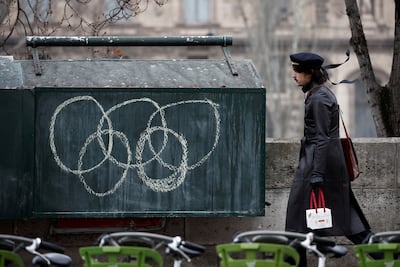Avid runner Anne-Marie Bouhelier jogs nearly every day past a century-old carousel featuring wooden horses at the Champ de Mars, near the Eiffel Tower.
But on a recent winter morning, the 65-year-old Paris resident found the horses packed away and unhappy employees preparing for six months of unemployment.
The Champ de Mars has become a major construction site as workers clear drains, fix stone benches and rip out trees to prepare this city for this summer's Olympic and Paralympic Games.
The park is scheduled to host beach volleyball and blind football tournaments. The triathlon and open-water races will begin in the Seine near by. At the docks, a giant clock counts down the days, hours, minutes and seconds until the start of the Games on July 26.
“Parisians are appalled. They’re taking away everything that makes the beauty and charm of Paris," said Ms Bouhelier, who used to bring her grandchildren to the hand-operated carousel. “They might as well build a highway in the middle of the park."
She commiserated with carousel employee Nicolas Cutrignelli, 56. “It’s unacceptable to have to close for so long with no compensation,” said Mr Cutrignelli, a father of two.
'Pride and celebration'
President Emmanuel Macron has promised a “wonderful moment of French pride and celebration”. In a speech last week, he suggested potential highlights would include horse riding at Versailles Palace and surfing off the coast of Tahiti, part of French Polynesia.
But high prices and complicated logistics are causing many to grumble.
Metro ticket prices will double, the number of passengers on already congested public transport is expected to increase by 15 per cent and a QR code system has been put in place to gain access to certain areas owing to fears of terrorist attacks.
A cause of particular concern is the open-air launch ceremony on the Seine. Previous Games favoured closed stadiums but organisers in Paris have opted for a grandiose fleet of 160 boats sailing past landmarks including Notre Dame Cathedral and the Louvre.
French security authorities are well aware this setup may leave athletes and crowds more exposed to potential attacks. The number of those set to attend the opening ceremony has been reduced from 600,000 to 300,000.
Leaders are doing their best to sound reassuring. "We are confident. We'll do everything that is in our power to make sure that these Games can be delivered in a safe environment," Paris 2024 chief executive Etienne Thobois told the BBC.

Last week, local authorities announced the recruitment of hundreds of Metro and bus drivers. Police officers were on Tuesday awarded a one-off bonus of up to €1,900 ($2,065) after two days of protests to secure higher wages.
The stakes are high. France expects 15 million visitors during the Games. Mr Macron has warned he wants organisation to be "perfect". The French capital is already among the top 10 most-visited cities in the world and close to 30 million tourists flocked to the city last year.
Booksellers' lawsuit
Yet many tourists are unaware of how the Olympics will affect some of their favourite spots. They include open-air stalls along the Seine selling antique books and souvenirs. The so-called bouquinistes perpetuate a tradition that started among booksellers in the 16th century and have become a Paris landmark.
They view themselves as victims of the Games and have sued the city for compensation after it announced the temporary removal from mid-July of nearly half their stalls. There are fears terrorists could use these stalls to shoot at the crowd or stash weapons during the opening ceremony.
But Londoners Chris and Lorraine, who bought decorative coasters from a bouquiniste during a short trip to Paris, were not convinced. Terrorist threats can come from everywhere, they said.
“There’s a danger of sterilising the city, of ripping its guts out,” said Chris. “Why not make it look like the Paris tourists like and expect?”
Standing by his green boxes full of books, Jean, a bouquiniste, said he did not believe he would be able to return as promised on August 1.

He highlighted a promise made by Mr Macron in October – later broken – that bouquinistes would “participate in the ceremony in one way or another" and that their boxes would remain in place.
“Olympic Games are bad news,” Jean told The National. He declined to give his surname due to the legal battle with the city, which did not respond to a request for comment.
Despite fears of disruption, many hope the Games will at least bring in some money by renting their flats at sky-high prices while they flee the city to secondary homes. In less touristy areas of the capital, restaurant owners also view athletes as potential customers. An impact study published in July found the Games could generate up to €10.7 billion for the Paris region.
Colette, a 58-year-old Parisian who runs a restaurant serving traditional French cuisine in the 15th arrondissement, said she has already been contacted about the possibility of feeding athletes expected to train nearby. “I hope the Games will bring some movement to the neighbourhood,” she said.
Her restaurant is within walking distance from Arena Paris South, where a number of events will be held including volleyball, table tennis and weightlifting. Events will also be held across the city in more famous venues such as Stade de France, Roland-Garros and Parc des Princes in the 16th arrondissement, and the Paris Arena in Nanterre.

Hotels to benefit
For visitors, securing affordable tickets and housing has become a challenge. Headlines on high prices are multiplying despite 1 million tickets being issued at the reasonable price of €24. But lower-priced tickets are among the most difficult to secure and front-row seats at the opening ceremony now cost at least €2,700 on the Paris 2024 website.
A recent poll conducted among three and four-star hotels near the Seine by the consumer protection association UFC Que Choisir also caused a stir. The average cost of one night in a hotel on July 26 has tripled to more than €1,000. One hotel increased its prices by 585 per cent.
This practice is not unusual. During the Champions League final in May 2022, British media reported on desperate Liverpool fans forced to pay prices three times higher than average for a hotel room. Price gouging came on top of chaotic scenes outside the Stade de France before and during the match, with the situation later blamed on poor organisation by French police and European football's governing body Uefa.

Yet some hotels are reportedly also telling potential guests that one-night bookings are not available in an attempt to push them to pay for several nights in a row, according to UFC Que Choisir.
This is technically illegal but is tolerated during exceptionally high-profile events, said Arnaud de Blauwe, editor in chief of the association’s magazine Que Choisir.
The department in charge of fraud prevention at the Economy Ministry (DGCCRF) says it has intensified controls ahead of the Games.
In 2024, it aims to implement 17,000 controls in all sectors, including hotels, restaurants, and transport, a spokesperson told The National in an email. Close to 3,000 agents, including 1,800 investigators, are scattered across the country.
Hotels are free to set their prices, but the state's role is to guarantee "a fair balance of competitive relations," said the DGCCRF.
"A specific investigation and control system was deployed ahead of the 2023 Rugby World Cup and will continue until the end of the Olympic and Paralympic events," it said.
"Our services control, online and on-site, tourist establishments, hotels and restaurants, transport professionals and the safety of non-food products."
The state body has invited consumers, including foreign tourists, to report issues on an application called SignalConso.
But it’s unlikely the DGCCRF, which is increasingly understaffed, will push back too hard against hotels, said Mr de Blauwe. It might be politically unwelcome for the government to stop the hospitality sector from reaping the benefits of such a money-spinning event.
“The French administration is aware that a number of sectors must profit from the economic benefits provided by the Games,” he said.
"What's clear is that high-profile sporting events like football World Cups and Olympic Games are not events geared for the masses any more," said Mr de Blauwe. "You need to be rich or to have saved money for a long time to attend them. The Paris Games will be no exception."















